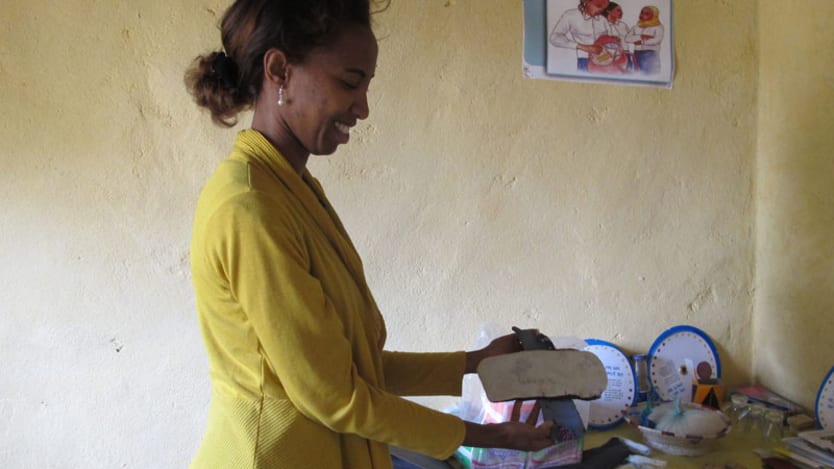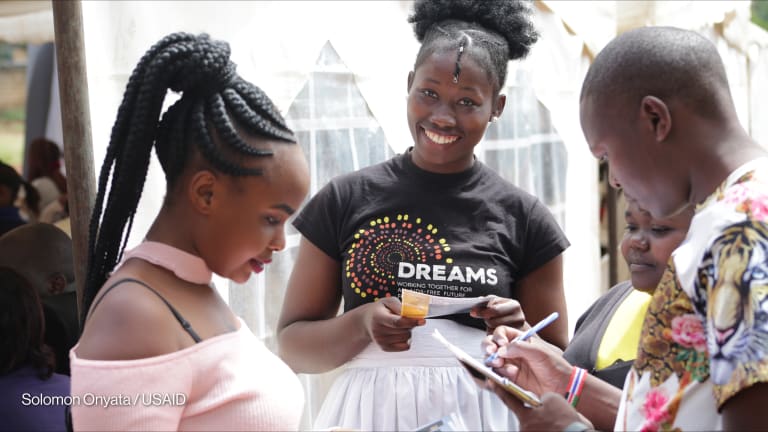Menstrual health, while excluded from SDGs, gains spotlight at UN political forum

UNITED NATIONS — Aid and development responses to menstrual health management focus too much on supplying sanitary products, and not enough on addressing the underlying challenges of education and stigma, some development and human rights experts say.
A high-level political forum at the United Nations last week showcased 46 countries’ progress and shortcomings on reaching several Sustainable Development Goals, with the release of voluntary national reviews by governments including Canada, Vietnam, and Egypt. Menstrual health management itself is not part of the SDGs, but the two-week event placed a rare spotlight on the issue, which is a crosscutting sanitation, education, and human rights challenge.
See more stories:
► In India, can a manufacturing startup lead a feminine hygiene revolution?
► Opinion: 4 ways to address menstrual stigmas, taboos and discrimination
There is no comprehensive, global research on the impact menstruation can have on derailing a girl’s education, for example, or otherwise preventing her full, active participation in society.
But there are recent studies addressing the stigma and social isolation that may accompany menstruation. Many women and girls in developing countries still go without adequate products, disposal systems, and information, according to the health and research organization PSI. About 2.5 million people still lack access to improved sanitation, a trend that tends to disproportionately impact women and girls.
Menstruation health management research is quickly catching on, says Inga Winkler, a lecturer in human rights at Columbia University’s department of political science. That could be helpful in better deciphering trends and common — but likely incorrect — statistics, like that 1 in 10 girls in sub-Saharan Africa miss school during their menstrual cycle.
“What I see with the research is it is happening so quickly. It’s not there are no studies — [there are] studies that look at school attendance, health impacts. But when you look at it from a policy perspective, there is a tendency to generalize,” she said. “The idea that 1 in 10 girls from Africa are dropping out of school — that is the evidence we do not have. There are studies that show linkages, but it is very complex and policymakers would like to have it [accurate information].”
Despite advocacy efforts during the creation of the SDGs’ 169 indicators, menstruation is not included in the framework under SDG 6, which calls for universal and equitable access to safe, affordable drinking water, as well as adequate and equitable sanitation and hygiene for all by 2030.
And while it is often discussed under the context of water, sanitation, and hygiene work, implementation of menstrual health programs and education would be better served if they went beyond the issue of WASH, some experts say.
“Menstrual health and hygiene is actually a sentinel issue, if we are looking at the integrated nature of the SDGs. There is no target or indicator for menstrual health within the SDGs, and right now, it is generally viewed as a Goal 6 problem,” said Lisa Schechtman, the director of policy and advocacy at the NGO WaterAid America.
“It is an issue that has been under the WASH sector leadership for many years, but the sector alone cannot address the gender-based discrimination and stigma issues that continue to perpetuate,” she continued.
That would include focusing more on other connected issues, while not disregarding the importance of access to sanitary pads or other materials.
“There is this emphasis on pads. Generally the development sector wants quick fixes and it seems so easy to give pads to girls and then have a solution to the problem, but the reality is so much more complex and without addressing that we will not see real change,” Winkler said.
“I don’t want to belittle it. I would not want to be without any materials when I menstruate, but there is so much more […] : The social stress, the stigma that relates to it — and that is really one of the key points,” she continued.
Two different side events during the recent high-level political forum focused on menstrual health management. Experts called for broader recognition of menstrual health management challenges, and for more detailed research of how it impacts the lives of women and girls.
And other recent initiatives, such as the first regional menstrual health symposium in Johannesburg, South Africa, this May, hosted by the U.N. Population Fund and Southern Africa Regional Office, are helping to place the issue on the map, says Winkler.
Bangladesh is one of the few countries where the national government is actively engaged on menstrual health management, Mahbuba Kumkum, a program manager at Simavi, said during one of the sessions. But there have been shortcomings with the actual responses to the issue.
“The [aid and development] sector could be doing itself a disfavor focusing on the technical, cleanliness aspects of menstrual health management,” Kumkum said. “Something we could be doing more of is to have a focus on rights-based approaches. [The idea is to] really address broader questions of health and look at how it affects different facets of life.”
“We have to go back to governments and push them to start taking [SDG] 6.2 and taking these aspects of gender equality more seriously and bringing it to the top.”
WaterAid America’s work everywhere from Latin America to the Middle East includes menstrual health and hygiene components, primarily through its school programs. Part of this involves ensuring the use of private, safe latrines where girls have the chance to wash reusable cloths or change their clothes. The work also includes education on how to make reusable products, and engagement with boys and men to help reduce stigma and increase accurate information.
That work also still has some limitations, Schechtman says .
“There is only so far that [we] can go if we do not do really targeted work in partnership with organizations that have strong expertise in addressing harmful gender norms,” she said.
Search for articles
Most Read
- 1
- 2
- 3
- 4
- 5








